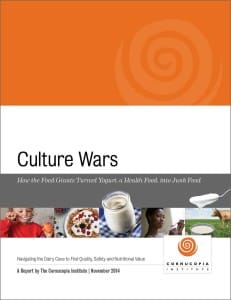In December of 2014, Cornucopia released its latest report, Culture Wars: How the Food Giants Turned Yogurt, a Health Food, into Junk Food. The report accuses marketers such as Dannon, Yoplait, and Chobani of misleading consumers into purchasing yogurts with very high levels of sugar and a wide variety of potentially unsafe additives.
Cornucopia also published an accompanying scorecard that rates yogurt brands on their usage of these additives and on other factors such as the amount of added sugar and whether the brands are certified organic. Due to the enormous size of the yogurt market, the scorecard rates brands of yogurt, rather than individual products.
Since the publication of Culture Wars, Cornucopia has received a number of questions from the public. Listed below are some of the most common ones, along with answers that will make the scorecard more useful.
What elements are used in determining a brand’s score, and what do the numbers mean?
We graded brands based on the following on the ingredient labels: thickeners, carrageenan (a potential inflammatory agent), artificial sweeteners, type of added sugar, total sugar, coloring, artificial coloring, natural/artificial flavoring, synthetic nutrients, milk protein concentrate, and preservatives. For each question, brands received 0 points if a given additive was present anywhere in their product line and 100 if it was absent. Brands also received points for being certified organic. A thorough explanation of the scoring criteria is linked on the scorecard.
Why do organic brands receive a higher rating?
Organic brands receive a higher rating because there are scientifically proven nutritional benefits to consuming organic milk over conventional. Organic milk has been found to have higher levels of beneficial fats, including conjugated linoleic acid (CLA), omega-3s, and higher levels of naturally occurring beta carotene (vitamin A), tocopherols (vitamin E), and the antioxidants lutein and zeaxanthin. In addition, organic cattle are not given growth hormones or fed GMO grain that has higher glyphosate residues from the use of Monsanto’s Roundup Ready seed technology.
My favorite brand gets a very low rating, but it offers a plain variety with no bad ingredients or added sugar.
The ratings are intended to shine a spotlight on those corporations primarily responsible for turning yogurt into junk food, and to assist consumers as they navigate the wide array of yogurt choices at the supermarket. Brands are graded on whether each element we looked for is present in any yogurt item they produce. Some brands with very low scores do offer plain varieties that are reasonably healthy choices. We urge consumers to read ingredient labels closely and look over a new infographic we have created that shows which ingredients to avoid. Our goal is to showcase the most trustworthy manufacturers.
You deducted points if the amount of sugar was deemed high. Doesn’t yogurt naturally contain sugar?
Yes, there is sugar (lactose) in yogurt that comes from the milk that is cultured to make it, and nutrition labels do not list added sugar, only total sugar present. To allow for the sugar that is naturally occurring in yogurt, we gave full points to brands that had 12 grams of sugar or less per six ounces. Beyond 12 grams, we deducted 10 points for each gram. Cornucopia’s research indicates that all plain (unsweetened) varieties available in the marketplace had less than 12 grams of sugar per six ounces.
Why can’t I print the scorecard?
Due to the amount of information within the online scorecard, it cannot be viewed well in a printable format. We have created a printable version of the chart, available by request by emailing [email protected]. Please be aware that the data online is regularly updated.
Why isn’t my favorite brand included in the scorecard?
We endeavored to include all brands that meet the FDA’s standard of yogurt (milk base with live and active cultures) available in the United States. By definition, this does not include plant-based yogurts. If you know of a brand we missed, please let us know and we will add it.


